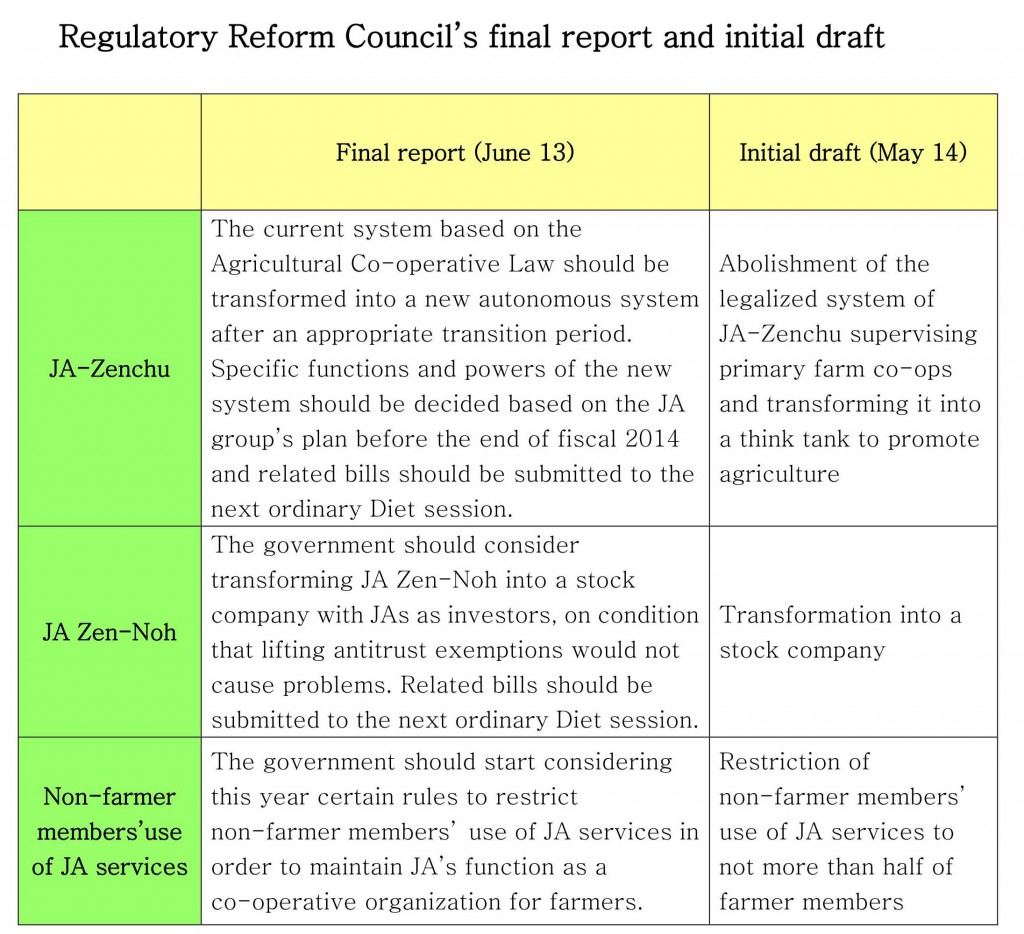YDK_6113-300x258.jpg)
Motoyuki Oka, head of the Council for Regulatory Reform, hands a final report to Prime Minister Shinzo Abe at the prime minister’s office on Friday, June 13.
The Council for Regulatory Reform came up with its second proposal on Friday, June 13, calling for a drastic overhaul of the agricultural co-operative system in the coming five years.
The recommendations, submitted to Prime Minister Shinzo Abe, asked that related bills be submitted to the ordinary Diet session next year, but conclusions for many of the proposals, such as the controversial issue of how to reform the functions and powers of the Central Union of Agricultural Co-operatives (JA-Zenchu), are left for future discussions.
The council proposed around 230 measures, up from some 140 submitted last June, concerning five sectors – health and medical services, employment, ventures and information technology, agriculture and trade and investment. The measures, listing those for the agricultural sector for the first time, will be reflected in the government’s deregulation action plan and the growth strategy to be released later this month.
Abe expressed strong determination to conduct drastic reform, saying that agricultural reform should be conducted from scratch and will not end up simply as a superficial changing of the organizational status.
Major proposals for agricultural reform include revising the agricultural co-operative system, agricultural committees and requirements for setting up agricultural production corporations. Radical expressions used in the panel’s initial draft disclosed last month were weakened in the final report under political pressure from the ruling Liberal Democratic Party which has cozy relations with the JA group. Still, Sumitomo Corp. adviser Motoyuki Oka who heads the panel noted its initial proposals are reflected in the final recommendations, denying criticisms that the report was watered down.
Regarding JA-Zenchu, the report recommends that it should be “transformed into a new system” that would allow primary agricultural co-ops to operate with more autonomy. The government and the LDP will discuss specific steps to reform the organization, taking into consideration its self-reform plan, and draw up bills for submission to the Diet after it opens in January.
Although the phrase “abolishment of JA-Zenchu” included in the initial draft was dropped, the issue is likely to become a focus of future discussions, as voices calling for scrapping of the organization remain strong among the government.
As for the National Federation of Agricultural Co-operative Associations (JA Zen-Noh), the report called on the organization to consider transforming itself into a stock company on condition that no problems would occur even if the current antitrust exemption is lifted, virtually leaving the decision making to JA Zen-Noh itself.
The panel’s proposal on non-farmer members’ use of JA’s services is also likely to become an issue of concern, as it called for the need to create certain rules to restrict such members’ use of the services.
It also recommended that majority of the JA’s board members should be certified farmers or professionals in the field of sales of agricultural products.
As for agricultural production corporations which can own farmlands, the report said investment restriction by non-agricultural companies which is currently set at 25 percent or less should be increased to less than 50 percent.
The election system to select agricultural committee representatives should be abolished, the report said, proposing that the representatives be selected by municipal heads with approval from municipal assemblies.
(June 14, 2014)


